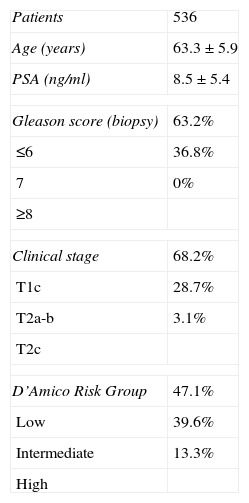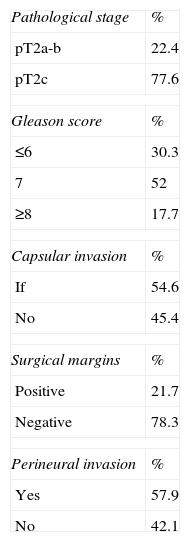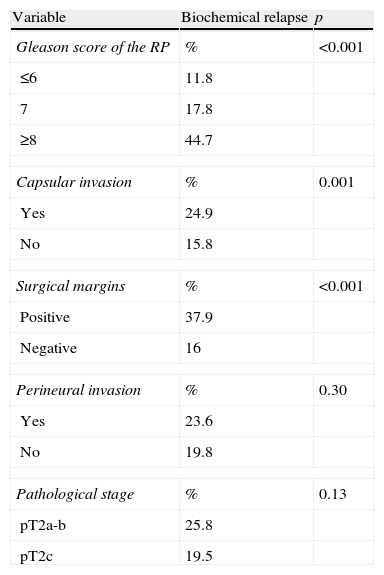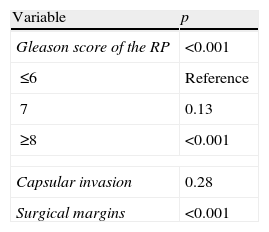To analyze the impact on the recurrence-free biochemical survival of tumor involvement of surgical resection margins in patients with localized prostate cancer (pT2) in the prostatectomy specimen and its implications for adjuvant treatment.
Materials and methodRetrospective study of 536 patients with stage pT2 prostate cancer, treated with radical prostatectomy between 1996 and 2007. Subsequent to the prostatectomy, the following variables were collected: Gleason score, pathological stage, capsular invasion, surgical margins and perineural invasion. We performed a univariate analysis and subsequently adjusted it by means of a Cox proportional hazard model (enter method).
Results21.7% presented positive surgical margins and 20.9% developed biochemical recurrence after a mean follow-up of 57 months. 37.9% of the patients with pathological involvement of the resection surgical margins presented biochemical recurrence against 16% that did not have it (p<0.001). In the multivariate analysis, only the surgical margin (p<0.001) and the Gleason score greater or equal to 8 (p<0.001) behaved as independent biochemical recurrence factors. On stratifying the series according to these two variables, we found that the patients with positive surgical margins and a Gleason score of ≤7 have a recurrence probability at 5 and 10 years of 35% and 50% against 74% and 87% in the group with positive surgical margins and a Gleason score of ≥8 (p=0.002).
ConclusionPatients with pT2 prostate cancer, positive surgical margins and a Gleason score of ≥8 will benefit from adjuvant radiotherapy. 50% of the patients with positive margins and a Gleason score of ≤7 will not recur, which means that the indication of adjuvant radiotherapy continues to be controversial.
Analizar el impacto sobre la supervivencia libre de recidiva bioquímica de la afectación tumoral de los márgenes quirúrgicos de resección en los pacientes con cáncer de próstata en estadio localizado (pT2) en la pieza de prostatectomía y su implicación en el tratamiento adyuvante.
Material y métodoEstudio retrospectivo de 536 pacientes con cáncer de próstata en un estadio pT2 tratados con prostatectomía radical entre 1996 y 2007. Posteriormente a la prostatectomía se recogieron las siguientes variables: score de Gleason, estadio patológico, invasión capsular, márgenes quirúrgicos e invasión perineural. Se realizó un análisis univariante y posteriormente se ajustó mediante un modelo de riesgos proporcionales de Cox (método enter).
ResultadosEl 21,7% presentó márgenes quirúrgicos positivos y el 20,9% desarrolló recidiva bioquímica con una mediana de seguimiento de 57 meses. El 37,9% de los pacientes con afectación patológica de los márgenes quirúrgicos de resección presentó recidiva bioquímica, frente al 16% de los que no la tenían (p<0,001). En el análisis multivariante solo el margen quirúrgico (p<0,001), y el score de Gleason mayor o igual a 8 (p<0,001) se comportaron como factores independientes de recidiva bioquímica. Al estratificar la serie según estas dos variables encontramos que los pacientes con márgenes quirúrgicos positivos y score de Gleason ≤ 7 tienen una probabilidad de recidiva a los 5 y 10 años del 35 y del 50%, frente al 74 y 87% en el grupo con márgenes quirúrgicos positivos y score de Gleason ≥ 8 (p=0,002).
ConclusiónLos pacientes con cáncer de próstata pT2, márgenes quirúrgicos positivos y score de Gleason ≥ 8 se beneficiarán de una radioterapia adyuvante. El 50% de los pacientes con márgenes positivos y un score de Gleason ≤ 7 no presentarán recidiva, por lo que la indicación de radioterapia adyuvante sigue siendo controvertida.












